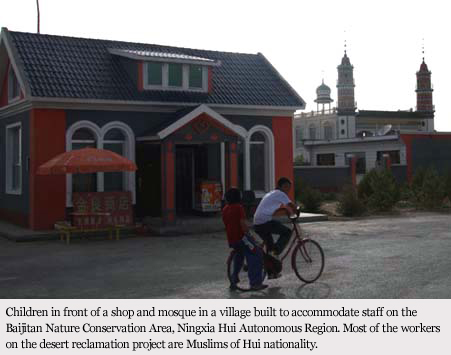The 409 employees enjoy excellent working conditions. What looks from the distance like a development of rather plush villas that would be considered quite desirable properties in the south of England, turns out to be the workers' cottages. They are set among lush gardens, plant nurseries, and fruit trees near a large pond with a walkway and a pavilion. Mr. Wang told us the cottages cost 70,000 yuan to build but the workers can buy them at a subsidized price of 30,000 yuan. Many of the workers are Muslims from the Hui ethnic group and the small village includes a mosque which, in keeping with the local style, has multiple minarets.

Workers with children attending primary school receive a subsidy of 600 yuan per year; middle school students get 700 per year, high school students 800, technical college students 900, and university students 1000 yuan.
The conservation project is state owned, but Mr. Wang told us that the funds provided by the government only cover about a fifth of its operating costs. The center has to self-finance the remaining four fifths by doing business, hiring its staff out as consultants or workers on other conservation projects and selling plants raised in its nurseries. Mr. Wang said he has given every employee a personal target to raise 10,000 yuan annually for the center.
Despite the funding shortfall, Mr. Wang told us he felt China's government was attaching more and more importance to environmental projects; but he said that state funding will never be enough, and help is also needed from society at large and especially from the international community. He told us that when the US Ambassador visited the project, he passed on a personal request to President Bush to stop the war in Iraq and shift his attention to environmental protection. "There is only one planet earth", Mr Wang said, "and protecting the environment is everyone's responsibility".
Among international supporters of the project, Mr. Wang singled out Japan for particular praise, saying that Japanese NGOs in particular had provided a great deal of advice as well as practical and financial assistance.
The Baijitan conservation project has become internationally famous; as we were talking to Mr. Wang, a delegation of environmental protection officials from nine Arab countries, Jordan, Syria, Egypt, Sudan, Morocco, Yemen, Mauritania, Lebanon and Palestine, arrived on a visit. Mr. Wang has been honored as a model worker and a national hero, but he shows no signs of slowing down. His mind is focused on future obstacles, not past achievements: "We have three big problems", he told us as we left, "there's not enough money, not enough water and not enough business opportunities to fund our work."
(China.org.cn by John Sexton and Pang Li, July 21, 2008)